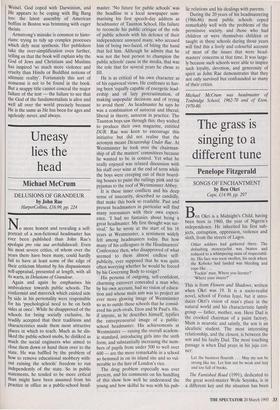Uneasy lies the head
Michael McCrum
DELUSIONS OF GRANDEUR by John Rae HarperCollins, £16.99, pp. 224 No more honest and revealing a self- portrait of a non-fictional headmaster has ever been published than John Rae's apologia pro vita sua archididascali. Even his most severe critics, of whom over the Years there have been many, could hardly fail to have at least some of the edge of their criticism blunted by his dispassionate self-appraisal, presented at length, with all its warts, in Delusions of Grandeur.
Again and again he emphasises his ambivalence towards public schools. The conformist and maverick which existed side by side in his personality were responsible for his 'psychological need to be on both sides at once'. While he disapproved of the schools for being socially exclusive, he readily accepted that their traditions and characteristics made them most attractive places in which to teach. Much as he dis- liked the public-school snobs, he disliked as much the social engineers who aimed to close them down or hand them over to the state. He was baffled by the problem of how to remove educational snobbery with- out ruining the schools' freedom to run independently of the state. So in public statements, he tended to be more critical than might have been assumed from his practice in office as a public-school head-
master. 'No future for public schools' was the headline in a local newspaper sum- marising his first speech-day address as headmaster of Taunton School. His failure to reconcile his public critique of the role of public schools with his defence of their independence annoyed many, who accused him of being two-faced, of biting the hand that fed him. Although he admits that he was not the best person to champion the public schools' cause in the media, that was the role that for several years he chose to fill.
He is as critical of his own character as of his equivocal views. He confesses to hav- ing been 'equally capable of energetic lead- ership and of lazy procrastination, of making unpopular decisions and of trying to avoid them'. As headmaster he says he was a combination of autocrat and liberal; liberal in theory, autocrat in practice. The Taunton boys saw through this: they wished to produce their own magazine, entitled DUR. Rae was keen to encourage this initiative but did not realise that the acronym meant Dictatorship Under Rae. At Westminster he took over the chairman- ship of all the masters' committees because he wanted to be in control. Yet what he really enjoyed was relaxed discussion with his staff over wine at the end of term while the boys were creeping out of their board- ing houses to paint the railings pink and tie pyjamas to the roof of Westminster Abbey. It is these inner conflicts and his deep sense of insecurity, described so candidly, that make this book so readable. Past and present headmasters in particular will find many resonances with their own experi- ence. 'I had no fantasies about being a great headmaster. My first thought was sur- vival.' So he wrote at the start of his 16 years at Westminster, a sentiment widely felt among headmasters today. But how many of his colleagues in the Headmasters' Conference then, who disapproved of what seemed to them almost endless self- publicity, ever supposed that he was quite often worrying whether he would be forced by his Governing Body to resign? His persona of outgoing, self-confident, charming extrovert concealed a man who, by his own account, had no vision of educa- tion and whose main aim was to project an ever more glowing image of Westminster so as to outdo those schools that he consid- ered his arch-rivals, Eton and St Paul's. He, if anyone, as he describes himself, typifies the entrepreneurial image of a public- school headmaster. His achievements at Westminster — raising the overall academ- ic standard, introducing girls into the sixth form, and substantially increasing the num- bers of pupils from under 500 to well over 600 — are the more remarkable in a school so hemmed in on its island site and so vul- nerable to the lure of London's vice.
The drug problem especially was ever present, and his comments on his handling of this show how well he understood the young and how skilful he was with his pub-
lic relations and his dealings with parents.
During the 20 years of his headmastering (1966-86) most public schools coped remarkably well with the problems of the permissive society, and those who had children or were themselves children or taught in these schools during those years will find this a lively and colourful account of most of the issues that were head- masters' concerns at that time. It was large- ly because such schools were able to inspire such loyalty, devotion, and generosity of spirit as John Rae demonstrates that they not only survived but confounded so many of their critics.
Michael McCrum was headmaster of Tonbridge School, 1962-70 and of Eton, 1970-80.


























































 Previous page
Previous page